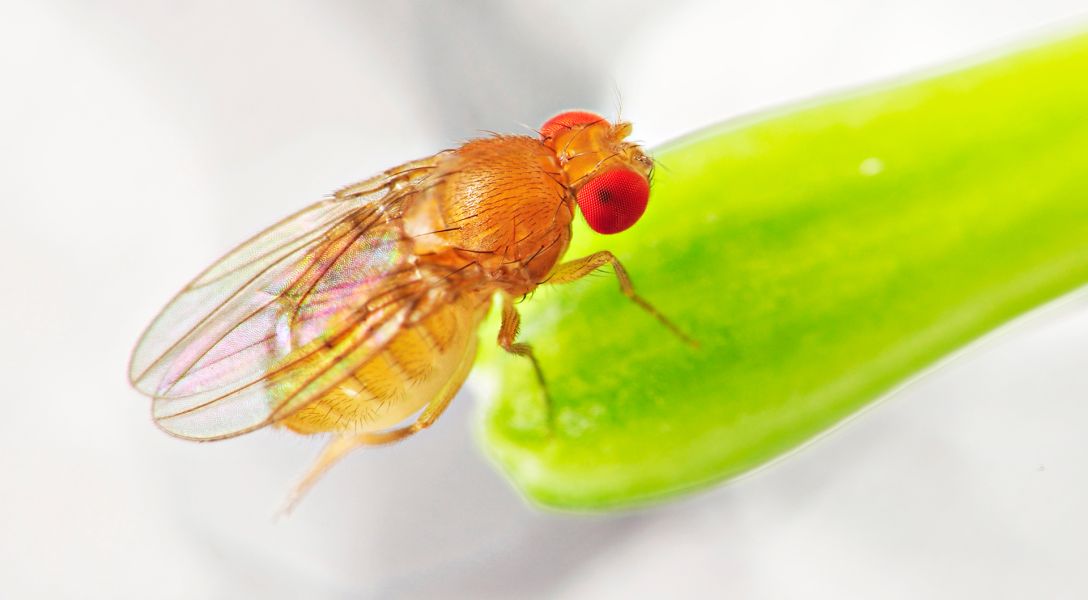By Krishna Ramanujan, Cornell Chronicle
A seminal fluid protein transferred from male to female fruit flies during mating changes the expression of genes related to the fly’s circadian clock, an innovative technique has revealed.
The finding, published Jan. 27 in the Proceedings of the National Academy of Sciences, could help explain how this protein, called sex peptide, alters the female’s behavior.
Post-mating, sex peptide has been shown to elicit increased egg-laying, aggression, activity and feeding, while reducing sleep and interest in mating in previously unmated females.
“Flies like to eat at certain times of day,” said Mariana Wolfner ’74, professor of molecular biology and genetics and a Stephen H. Weiss Presidential Fellow in the College of Arts and Sciences, and one of the paper’s senior authors. “They sleep at certain times, and the circadian clock machinery controls when flies are likely to do these things.
“What we’re seeing,” she said, “is that these very same behaviors – such as sleeping and eating – are changed after mating by the sex peptide. One way it might do that is by basically shifting the whole clock of the fly.”
The surprising findings were made possible by examining transcriptomes – RNA sequencing that reveals gene expression, or which genes are turned on and off – at many different time points, providing high-resolution data that illuminates the order in which changes occur. The method was conducted in the lab of Andrew Clark, the Jacob Gould Schurman Professor of Population Genetics in the College of Arts and Sciences, and the study’s senior and corresponding author.
In the study, the researchers used three treatments, all with female Drosophila that were reared together. One treatment served as an unmated control; in another, females were mated with a standard male; and in a third, females were mated with a male that did not produce sex peptide.
The study’s first author, Sofie Delbare, a postdoctoral researcher in the labs of Clark and Sumanta Basu, an assistant professor of statistics and data science in the College of Agriculture and Life Sciences, began by removing the heads of Drosophila females at 10 different time points in the first 24 hours after mating. She then ran transcriptomes for each of the time points. By taking such fine-scaled transcriptome measurements, the researchers hoped to discover which genes are implicated post-mating and how long it takes for a male’s sex peptide to cause changes in the female.
Across 10 time points and using three different treatments, the researchers discovered changes in the expression of over 1,000 genes. The massive amount of data was analyzed using another method, developed by co-authors in the Department of Statistics and Data Science, that clustered the gene expression data across the time periods and allowed Delbare to identify the most relevant biological patterns that changed over time.
“We really had a super detailed view of the female’s response to sex peptide,” Delbare said. “No one had looked in that much detail before, and having that high resolution helped us to find the earliest regulators that are changing and that are driving the next responses.”
In the first four hours after mating, Delbare and colleagues found changes in expression of genes involved in the female fly’s metabolism and the circadian clock. It is unknown what triggered these initial changes, but pheromones or seminal fluid proteins other than sex peptide are possible candidates. The initial effects were short term; they didn’t last without sex peptide and seemed to prime the system.
In a second phase, four hours after mating, the researchers discovered that sex peptide caused changes to genes that regulate circadian rhythms and genes that are regulated by circadian clock pathways.
The study opens the door for future work that explores such questions as: how sex peptide controls the circadian clock at a neural level; how modifying the clock may relate to observed post-mating responses; how long the effect lasts; and whether these effects occur in other organisms, given that circadian clock genes are highly conserved in many life forms.
The study was funded by the National Institutes of Health through a joint Initiative with the National Science Foundation.
This story was originally published in the Cornell Chronicle.



